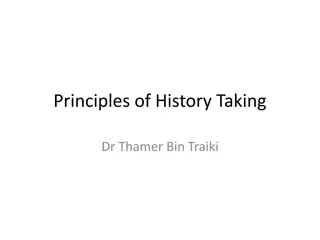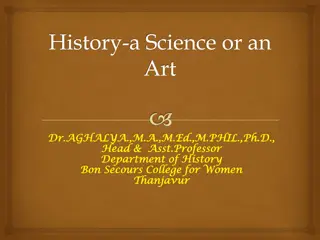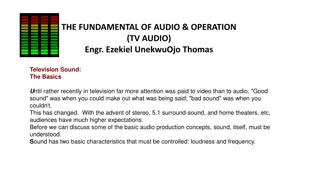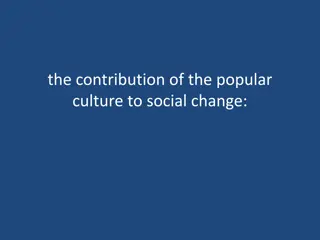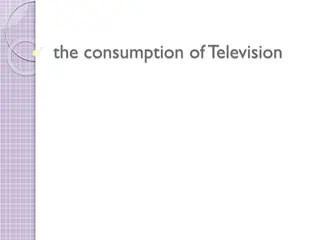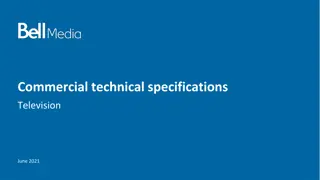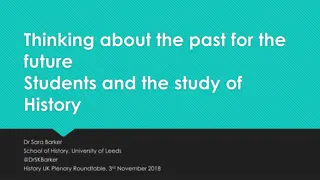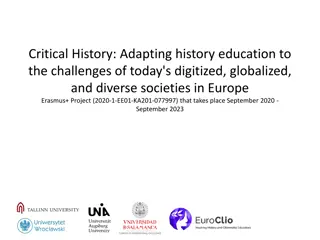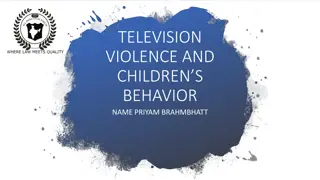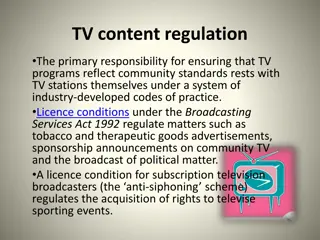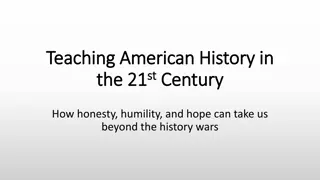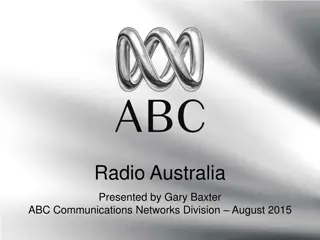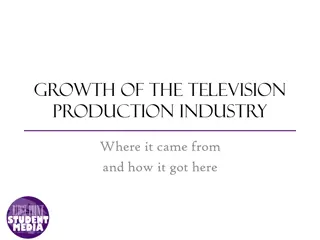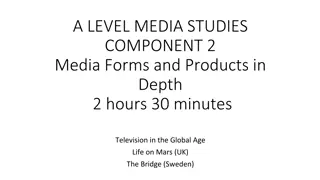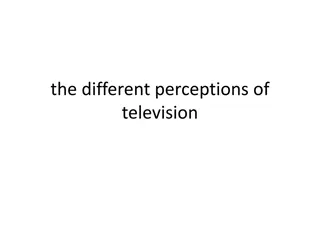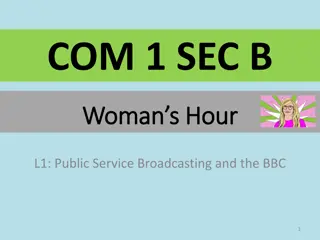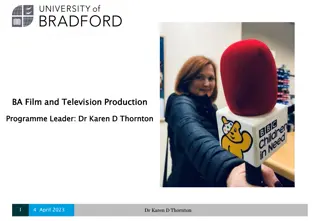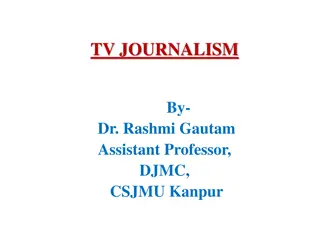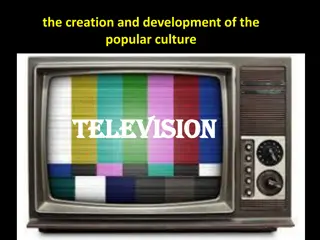Essential Lighting Techniques in Television Production
Lighting is a vital aspect of television production, setting the mood and enhancing the overall broadcast quality. Key lighting illuminates the subject, fill lighting reduces shadows, backlighting adds depth, side lighting creates drama, rim lighting highlights the subject, and mood lighting sets th
3 views • 9 slides
The Impact of Reality Television on Society
Reality television, where fact is sometimes stranger than fiction, has a significant influence on society. This form of entertainment often showcases ordinary people in various scenarios, leading to desensitization and acceptance of negative behaviors like aggression and bullying. The ethical implic
7 views • 17 slides
Principles of History Taking in Clinical Assessment
History taking is a crucial process in patient assessment, aiding in determining the etiology of medical issues. Obtaining an accurate history through proper questioning, active listening, and maintaining a professional appearance is vital for making accurate diagnoses. The history should follow a s
1 views • 35 slides
Essential Skills for Musculoskeletal History Taking
History taking is crucial in diagnosing musculoskeletal conditions, with a clinician being 60% closer to a diagnosis with a thorough history. This session covers the structure of history, MSK systemic review, pain assessment, swelling evaluation, and more. Students will learn to take a relevant hist
0 views • 24 slides
Understanding Television Commercial Production Process
Television commercials (TVCs) play a crucial role in advertising, promoting products, services, and ideas to a wide audience through television broadcast. This comprehensive guide covers the definition of TVCs, their objectives, steps in the production process (pre-production, production, post-produ
3 views • 34 slides
Is History a Science or an Art? Debating the Nature of Historical Study
Opinions are divided on whether history should be classified as a science or an art. While history employs techniques similar to scientific methods for research, certain aspects distinguish it from traditional sciences. Arguments against history as a science include the inability to forecast, the co
0 views • 12 slides
Magnetic Force and Acceleration of Electrons in Television Picture Tubes
An electron in a television picture tube is analyzed as it moves towards the front of the tube in a magnetic field. The magnetic force and acceleration of the electron are calculated, along with determining the linear speed of a proton moving in a circular orbit under a magnetic field. Additionally,
0 views • 6 slides
Understanding Uterine Cancer and Postmenopausal Bleeding
Dr. Khalid Akkour, Assistant Professor of Gynecologic Oncology at King Saud University Medical City, provides insights on uterine cancer and postmenopausal bleeding. The structured OSCE discusses important aspects such as taking a focused history, age, ethnicity, past gynecologic and obstetric histo
0 views • 154 slides
Understanding Audio Basics in Television Operations
Until recently, television focused more on video than audio. However, with advancements like stereo and surround sound, audience expectations have risen. This article delves into the fundamental characteristics of sound – loudness and frequency – and explores the various decibel levels in differ
6 views • 33 slides
Various Branches of History Explored
Explore different branches of history such as Political History, Constitutional History, Parliamentary History, Legal History, Military History, Diplomatic History, and Social History. Each branch delves into specific aspects of the past, shedding light on politics, governance, warfare, diplomacy, a
1 views • 18 slides
The Impact of Popular Culture on Social Change Through Television
Popular culture, as portrayed through television, holds the power to influence societal norms, intercultural understanding, and global awareness. While it can promote positive social change and awareness, there are concerns about cultural imperialism, excessive TV consumption, and the cultivation th
0 views • 15 slides
Roles and Responsibilities of Radio and Television Announcers
Radio and television announcers play a vital role in presenting program information, news, sports, and commercials to audiences both on and off the air. They read scripts, conduct interviews, moderate discussions, and engage with the community. Announcers at smaller stations often have additional du
0 views • 18 slides
The Relationship Between Mythology, Heroes, and Television Consumption
The consumption of television is prevalent across all demographics, connecting diverse audiences to a shared experience. By examining the influence of heroes and mythology on television content, we uncover how characters embody societal ideals and values. Through storytelling, television programs su
3 views • 18 slides
Commercial Technical Specifications for Television Channels - June 2021
This document details the technical specifications and application guidelines for content suppliers delivering material to various television channels under Bell Media. It includes information on traffic communication, parameters, electronic file delivery, and commercial instructions. Suppliers must
1 views • 12 slides
The Impact of Civil Rights Movement and President Eisenhower's Legacy
Explore the significant events like the Civil Rights Movement, the popular presidency of Dwight D. Eisenhower, the Federal Aid Highway Act of 1956, the Baby Boom Years, and the advent of television in the lives of Americans during the mid-20th century. Learn about civil rights, segregation, the Brow
3 views • 24 slides
Exploring the Significance of Studying History and Its Impact on Future Careers
Delve into the relevance of studying history and how it shapes future career opportunities. Discover insights from renowned history graduates and the valuable transferable skills gained from a history degree. Uncover the essence of history, its applications in modern society, and the importance of l
0 views • 16 slides
Enhancing History Education for Today's Societal Needs: Erasmus+ Project 2020-2023
This Erasmus+ project aims to adapt history education to modern challenges by preparing history educators to teach in a way that meets societal demands and incorporates the latest in history didactics. Partners focus on heritage, global dimensions, public history, and the role of the internet. Resul
1 views • 4 slides
Understanding Gynecological History Taking
This guide explores the process of taking a gynecological history, emphasizing the importance of thoroughness and patient permission. From introductions to obtaining consent, the steps involved in gynecological history taking are outlined. Attention is given to the nuances of gynecological versus ge
0 views • 18 slides
Impact of Television Violence on Children's Behavior
Television violence has a significant influence on children's behavior as they may become desensitized to violence and even mimic what they see on TV. Parents need to monitor and limit their children's TV viewing, engage in discussions, and block inappropriate content to protect them from negative e
0 views • 15 slides
Television Content Regulation in Australia
Television content regulation in Australia is overseen by industry-developed codes of practice and specific licence conditions under the Broadcasting Services Act 1992. TV stations hold the primary responsibility to ensure that programs reflect community standards. Regulations cover areas such as to
0 views • 12 slides
Navigating American History: Honesty, Humility, and Hope in the 21st Century
History is a subject full of debate and interpretations influenced by the current societal divisions. The teaching of American history is undergoing significant challenges, particularly regarding issues of race and equality. The 1619 Project aims to reframe American history by addressing the foundat
0 views • 19 slides
Exploring Conflict and Compromise in History Through National History Day 2018
National History Day 2018 focuses on the theme of Conflict & Compromise in History, encouraging students to delve into topics such as failed compromises leading to revolutions, the Vietnam Generation, and conflicts like the Troubles in Ireland. Through research, students will explore historical cont
0 views • 18 slides
Understanding Television Research: Markets, Measurement, and Methodologies
Explore the world of television research through topics such as television markets, measurement approaches, local measurement services like Nielsen and Comscore, and Nielsen's measurement methodologies. Learn about Designated Market Areas (DMAs), Household Demographics, People Meters, Portable Peopl
0 views • 42 slides
Understanding Medical Records: History, Physical Examination, and Abbreviations
Medical records play a crucial role in documenting a patient's medical history and findings from physical examinations. The history and physical (H&P) document includes subjective information from the patient and objective observations by the examiner. The history (Hx) record covers personal medical
0 views • 20 slides
Radio Australia International Services Overview
Radio Australia, presented by Gary Baxter, is managed by ABC Communications Networks Division and provides both domestic and international services. It offers shortwave transmissions in multiple languages targeting remote areas in Australia and the Pacific region. Additionally, Radio Australia colla
0 views • 12 slides
Importance of Programming Diversity in Television Broadcasting
Diversity of programming in television is crucial for democracy and meeting the varied needs of audiences. The content emphasizes the significance of quality, independent programming that reflects a spectrum of opinions to inform the public effectively. It also discusses the impact of TV content on
0 views • 13 slides
Evolution of Television Production Industry and Communication Technologies
The growth of the television production industry is traced from early forms of communication such as drumbeats and smoke signals to the invention of the telegraph by Cooke and Wheatstone in 1830. The development of Morse code and wireless telegraphy by Guglielmo Marconi in 1899 revolutionized commun
0 views • 23 slides
Analysis of Genre Elements in Life on Mars and The Bridge
Television series like Life on Mars (UK) and The Bridge (Sweden) exemplify various genre theories and narrative structures. From discussing social, cultural, economic, and political factors affecting production to exploring media language and Neale's Genre Theory, these shows showcase how genres osc
0 views • 13 slides
Understanding Broadcast Television and Radio: A Comprehensive Course Overview
This course delves into the history, contemporary forms, and impact of broadcast television and radio, exploring academic approaches, traditions, and critical orientations in the field. Students will analyze ownership structures, audience dynamics, regulatory frameworks, and content production in na
0 views • 7 slides
The Importance of Pre-Production in Television Program Production
The process of producing a television program is divided into three stages: Pre-Production, Production, and Post-Production. Pre-Production is vital as it involves setting goals, planning, and decision-making, which ultimately lead to smoother production and editing processes. Planning saves time, e
0 views • 17 slides
Understanding Different Perceptions and Resistance to Television
Television plays a significant role in Australian lives, with resistance stemming from factors like content and over-commercialization. Some resist due to concerns about cultural identity, while others reject television altogether. Acceptance of television is evident through its widespread use as a
0 views • 16 slides
Future of ITU-D Study Question 8/1 Report Analysis
This report delves into the impact of terrestrial television broadcasting coexisting with telecommunication services, focusing on the transition to digital terrestrial television. It covers strategies for analogue switch-off, spectrum planning, and digital dividend use. The report also includes case
0 views • 16 slides
Insights into BBC's Public Service Broadcasting and Mission & Values
An examination of the British Broadcasting Corporation (BBC) focusing on its public service broadcasting role, history, remits, mission, and values. The content discusses the BBC's commitment to educate, inform, entertain, and its importance in providing impartial news, supporting learning, and deli
0 views • 11 slides
Gender Equity Policies in Film and Television Analysis Interview
Explore the evolution of gender equity in the film and television industries of Canada, Germany, and the UK over the past decade. Dive into the success, challenges, and potential interventions for enhancing gender equity. Uncover expert insights on the industry's commitment to gender equality and ra
0 views • 17 slides
Efficient Medical History Taking Guidelines
Medical history taking is a crucial step in diagnosis, involving the patient's account of illness and relevant information. Following a structured framework helps identify potential diagnoses. Key elements include personal information, chief complaint, presenting illness history, review of systems,
0 views • 51 slides
BA Film and Television Production Program at University of Bradford
Explore the BA Film and Television Production program led by Dr. Karen D. Thornton at the University of Bradford. Gain valuable skills in a nurturing environment, work with industry professionals, and be part of a diverse community. Prepare for a career in the creative industries with hands-on exper
0 views • 9 slides
TV Camera Shots and Functions in Television Productions
Explore the fascinating world of television camera shots and functions, including how the camera emulates the human eye, different movements of the camera and lens, and the various techniques used in television production to create dynamic visuals. From zooming in and out to panning and tilting, lea
0 views • 13 slides
Evolution and Development of Television Journalism
Television journalism has evolved over the years, with pioneers like John Baird and the BBC leading the way. The transition from black and white broadcasts to color marked a significant milestone. In India, television started as an experiment in 1959 and gradually expanded to reach a wider audience.
0 views • 8 slides
Ophthalmology History Taking: Importance and Components
Ophthalmology history taking is crucial for identifying and narrowing down differential diagnoses, screening for hidden diseases, and protecting patients from harm. Components include patient profile, chief complaint, history of present illness, past ophthalmic and medical history, drug and family h
0 views • 24 slides
The Evolution of Television: From Baird's Invention to Modern Broadcasting
Television has evolved from its humble beginnings with John Logie Baird's invention to become an integral part of modern life, offering entertainment, advertising, and diverse programming. The journey of television includes significant milestones such as the demonstration of color television, transa
0 views • 30 slides


